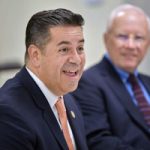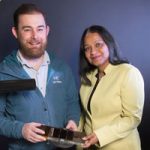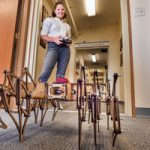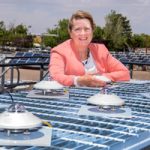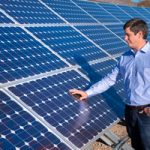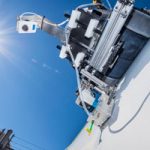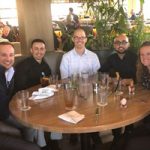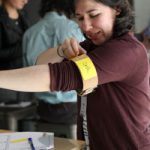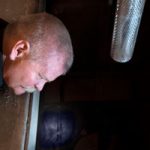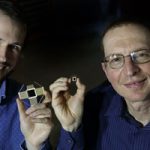Steve Younger joins roundtable to expand trades in New Mexico
Labs Director Steve Younger met with New Mexico 3rd District Congressman Ben Ray Luján at a recent forum to discuss the ACCESS Act, which would establish a five-year grant program run by DOE to create apprenticeship and pre-apprenticeship programs in colleges and technical education schools to fill nuclear industry jobs at national laboratories.
Budgets double for small business assistance projects
Sandia will be doubling the amount of technical assistance it provides to small businesses, following legislation signed into New Mexico state law this year. The new law, which took effect July 1, raises the cap on the value of services Sandia and Los Alamos national laboratories can offer New Mexico small businesses.
Students compete for best 3D-printed design during Sandia robotics camp
Sandia and R4 Creating hosted the second annual week-long robotics camp in May at the Robotics Vehicle Range. Local students competed in teams to create and print original 3D designs.
Global collaboration to study photovoltaic performance, reliability
An international community of research institutions, led by Sandia, to advance photovoltaic research and expand solar markets formally launched its work on May 14 in Munich, Germany. The organization provides a unique platform for studying photovoltaic performance and reliability in multiple, diverse environments and climates.
Rooftop solar panels get boost from Sandia tool
Homeowners and businesses may now have an easier time getting solar panels on rooftops thanks to software developed at Sandia. The new software can run a detailed, second-by-second simulation that shows utility companies how rooftop solar panels at a specific house or business would interact with a local electrical grid throughout the year.
Don’t set it and forget it — scan it and fix it with tech that detects wind blade damage
Drones and crawling robots outfitted with special scanning technology could help wind blades stay in service longer, which may help lower the cost of wind energy at a time when blades are getting bigger, pricier and harder to transport, Sandia researchers say.
Pilot program prepares future leaders
Thirty Sandia employees, working in departments ranging from engineering to security, recently finished a deep dive into leadership skills through the Future Leaders Pathway program. The seven-month pilot program provided an opportunity to build partnerships, identify personal strengths, and reflect about career goals and personal motivations.
Employees become entrepreneurs at inaugural Idea Sprint
Sandia hosted its first Idea Sprint at the Lobo Rainforest, where a couple dozen Sandia employees dove head first into entrepreneurial training. UNM’s Innovation Academy provided instructors for the two-day program that focused on product design, customer needs and communication.
UNM collaboration bolsters national security, science
Sandia and the University of New Mexico are joining forces to bolster national security and advance science and engineering under an agreement signed earlier this month. The umbrella Cooperative Research and Development Agreement allows the Labs and university to explore research collaborations among scientists, faculty and students in several areas, including ongoing projects.
Breakthroughs in neuromorphic computing demonstrate high efficiency, performance
Sandia researchers and collaborators at Stanford University and the University of Massachusetts, Amherst, recently have made breakthroughs in neuromorphic computing, which mimics the way the human brain carries out data-centric tasks.
